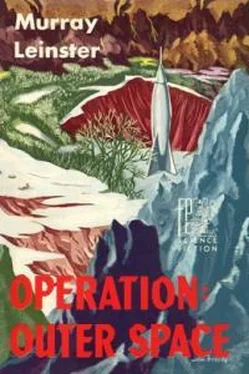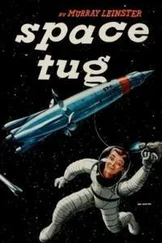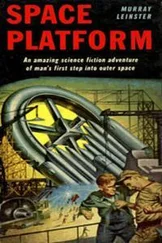The red light said: " Second stage ends ten seconds. "
And in ten seconds the rockets hiccoughed once more and were silent, and there was that sickening feeling of free fall, but he grimly made himself think of it as soaring upward instead of dropping—which was the fact, too—and waited until the third–stage rockets boomed suddenly and went on and on and on.
This was nearly normal acceleration; the effect of this acceleration was the feel of nearly normal weight. He felt about as one would feel in Earth in a contour–chair tilted back so that one faced the ceiling. He knew approximately where the ship would be by this time, and it ought to have been a thrill. Cochrane was hundreds of miles above Earth and headed eastward out and up. If a port were open at this height, his glance should span continents.
No…. The ship had taken off at night. It would still be in Earth's shadow. There would be nothing at all to be seen below, unless one or two small patches of misty light which would be Earth's too–many great cities. But overhead there would be stars by myriads and myriads, of every possible color and degree of brightness. They would crowd each other for room in which to shine. The rocket–ship was spiralling out and out and up and up, to keep its rendezvous with the space platform.
The platform, of course, was that artificial satellite of Earth which was four thousand miles out and went around the planet in a little over four hours, traveling from west to east. It had been made because to break the bonds of Earth's gravity was terribly costly in fuel—when a ship had to accelerate slowly to avoid harm to human cargo. The space platform was a filling station in emptiness, at which the moon–rocket would refuel for its next and longer and much less difficult journey of two hundred thirty–odd thousand miles.
The stewardess came up the ramp, moving briskly. She stopped and glanced at each passenger in each chair in turn. When Cochrane turned his open eyes upon her, she said soothingly:
"There's no need to be disturbed. Everything is going perfectly."
"I'm not disturbed," said Cochrane. "I'm not even nervous. I'm perfectly all right."
"But you should be drowsy!" she observed, concerned. "Most people are. If you nap you'll feel better for it."
She felt his pulse in a businesslike manner. It was normal.
"Take my nap for me," said Cochrane, "or put it back in stock. I don't want it. I'm perfectly all right."
She considered him carefully. She was remarkably pretty. But her manner was strictly detached. She said:
"There's a button. You can reach it if you need anything. You may call me by pushing it."
He shrugged. He lay still as she went on to inspect the other passengers. There was nothing to do and nothing to see. Travellers were treated pretty much like parcels, these days. Travel, like television entertainment and most of the other facilities of human life, was designed for the seventy–to–ninety–per–cent of the human race whose likes and dislikes and predilections could be learned exactly by surveys. Anybody who didn't like what everybody liked, or didn't react like everybody reacted, was subject to annoyances. Cochrane resigned himself to them.
The red light–letters changed again, considerably later. This time they said: " Free flight, thirty seconds. "
They did not say "free fall," which was the technical term for a rocket coasting upward or downward in space. But Cochrane braced himself, and his stomach–muscles were tense when the rockets stopped again and stayed off. The sensation of continuous fall began. An electronic speaker beside his chair began to speak. There were other such mechanisms beside each other passenger–chair, and the interior of the rocket filled with a soft murmur which was sardonically like choral recitation.
" The sensation of weightlessness you now experience ," said the voice soothingly, " is natural at this stage of your flight. The ship has attained its maximum intended speed and is still rising to meet the space platform. You may consider that we have left atmosphere and its limitations behind. Now we have spread sails of inertia and glide on a wind of pure momentum toward our destination. The feeling of weightlessness is perfectly normal. You will be greatly interested in the space platform. We will reach it in something over two hours of free flight. It is an artificial satellite, with an air–lock our ship will enter for refueling. You will be able to leave the ship and move about inside the Platform, to lunch if you choose, to buy souvenirs and mail them back and to view Earth from a height of four thousand miles through quartz–glass windows. Then, as now, you will feel no sensation of weight. You will be taken on a tour of the space platform if you wish. There are rest–rooms—. "
Cochrane grimly endured the rest of the taped lecture. He thought sourly to himself: " I'm a captive audience without even an interest in the production tricks. "
Presently he saw Bill Holden's head. The psychiatrist had squirmed inside the straps that held him, and now was staring about within the rocket. His complexion was greenish.
"I understand you're to brief me," Cochrane told him, "on the way up. Do you want to tell me now what all this is about? I'd like a nice dramatic narrative, with gestures."
Holden said sickly:
"Go to hell, won't you?"
His head disappeared. Space–nausea was, of course, as definite an ailment as seasickness. It came from no weight. But Cochrane seemed to be immune. He turned his mind to the possible purposes of his journey. He knew nothing at all. His own personal share in the activities of Kursten, Kasten, Hopkins and Fallowe—the biggest advertising agency in the world—was the production of the Dikkipatti Hour, top–talent television show, regularly every Wednesday night between eight–thirty and nine–thirty o'clock central U. S. time. It was a good show. It was among the ten most popular shows on three continents. It was not reasonable that he be ordered to drop it and take orders from a psychiatrist, even one he'd known unprofessionally for years. But there was not much, these days, that really made sense.
In a world where cities with populations of less than five millions were considered small towns, values were peculiar. One of the deplorable results of living in a world over–supplied with inhabitants was that there were too many people and not enough jobs. When one had a good job, and somebody higher up than oneself gave an order, it was obeyed. There was always somebody else or several somebodies waiting for every job there was—hoping for it, maybe praying for it. And if a good job was lost, one had to start all over.
This task might be anything. It was not, however, connected in any way with the weekly production of the Dikkipatti Hour. And if that production were scamped this week because Cochrane was away, he would be the one to take the loss in reputation. The fact that he was on the moon wouldn't count. It would be assumed that he was slipping. And a slip was not good. It was definitely not good!
" I could do a documentary right now ," Cochrane told himself angrily, " titled 'Man–afraid–of–his–job.' I could make a very authentic production. I've got the material! "
He felt weight for a moment. It was accompanied by booming noises. The sounds were not in the air outside, because there was no air. They were reverberations of the rocket–motors themselves, transmitted to the fabric of the ship. The ship's steering–rockets were correcting the course of the vessel and—yes, there was another surge of power—nudging it to a more correct line of flight to meet the space platform coming up from behind. The platform went around the world six times a day, four thousand miles out. During three of its revolutions anybody on the ground, anywhere, could spot it in daylight as an infinitesimal star, bright enough to be seen against the sky's blueness, rising in the west and floating eastward to set at the place of sunrise.
Читать дальше






